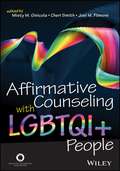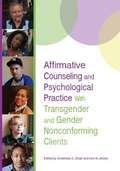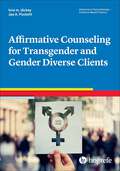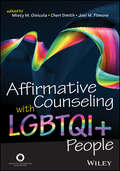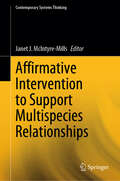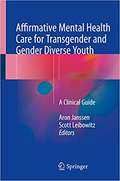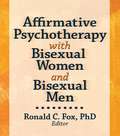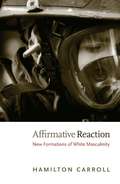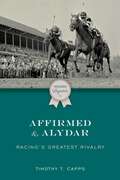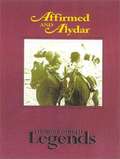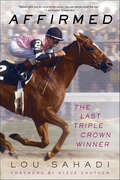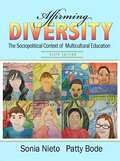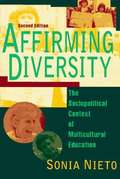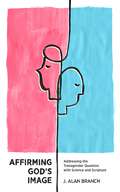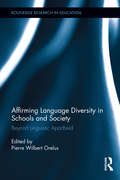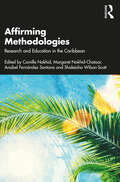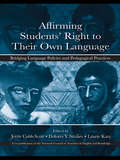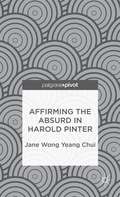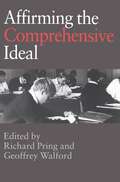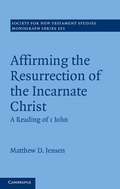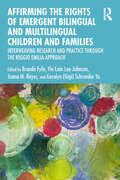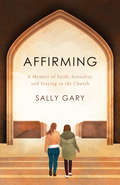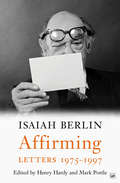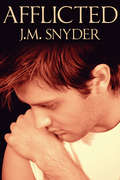- Table View
- List View
Affirmative Counseling With LGBTQI + People
by Cheri Smith Misty M. Ginicola Joel M. FilmorePossessing counseling competence in serving the lesbian, gay, bisexual, transgender, queer, ques-tioning, intersex, asexual, ally, pansexual/polysexual, and two-spirited (LGBTQQLAAP-2S, henceforth referred to as LGBTQI+) communities is important, particularly because previous research has shown that large numbers of this population seek therapy. If counselors are unprepared for work with this population, they could potentially do harm to these clients. Many counselors have not received adequate training to work with affectional orientation and gender minority clients; LGBTQI+ clients are aware of this deficit in the field and prescreen therapists for safety and competence in issues of affectional orientation and gender orientation. Although many standard counseling interventions will be appropriate for work with the LGBTQI+ population, counselors need an awareness and knowledge of this population and its cultures and subcultures that extend beyond typical client concerns.
Affirmative Counseling and Psychological Practice with Transgender and Gender Nonconforming Clients
by Anneliese A. Singh Lore M. DickeyFewer than 30% of psychologists report familiarity with transgender and gender nonconforming (TGNC) clients' needs, which indicates a large gap in knowledge, skill, and competence in this area of practice. This volume provides mental health practitioners with theory-driven strategies for affirmative practice with TGNC clients of different ages, ethnicities, sexual orientations, and religious backgrounds.
Affirmative Counseling for Transgender and Gender Diverse Clients
by Lore M. Dickey Jae A. PuckettExpert guidance on a collaborative approach to mental health care in a group with some unique needs A how-to guide to affirmative counseling with transgender clients Presents the best evidence-based care Instructions for strategies to improve inclusivity Illustrated with case studies Printable tools for clinical use This volume provides fundamental and evidence-based information on working with transgender and gender diverse people in mental health services. The authors, who are experts in the field, outline the key qualities of affirming mental health services, as well as explore strategies for improving inclusivity and what evidence-based care with trans clients looks like. They also provide insight into current topics, such as working with youth, the harmful and ill-advised approach known as rapid onset gender dysphoria, and whether and how autism is a co-occurring diagnostic concern. Practitioners will find the printable resources provided invaluable for their clinical practice, including sample letters of support for trans clients who are seeking gender affirming medical care.
Affirmative Counseling with LGBTQI+ People
by Cheri Smith Misty M. Ginicola Joel M. FilmoreThis current and comprehensive handbook will guide educators, students, and clinicians in developing the awareness, knowledge, and skills necessary to work effectively with LGBTQI+ populations. Twenty-five chapters written by experts in the field provide direction for working with clients in an authentic, ethical, and affirmative manner that is tailored to their individual strengths, needs, and identity. The book is divided into four sections, which explore the science behind gender and affectional orientation; developmental issues across the life span and treatment issues; the specialized needs of nine distinct populations; and the intersectionality of ethnicity and overlapping identities, the role of religion, and counselor advocacy. To further a deeper understanding of the content, each chapter contains an "Awareness of Attitudes and Beliefs Self-Check," a case narrative relating to the material covered, questions for discussion, and a list of online resources. The book concludes with an extensive glossary of terms, both preferred and problematic, which counselors working with these communities should understand and use appropriately. *Requests for digital versions from the ACA can be found on wiley.com. *To request print copies, please visit the ACA website here. *Reproduction requests for material from books published by ACA should be directed to permissions@counseling.org
Affirmative Intervention to Support Multispecies Relationships (Contemporary Systems Thinking)
by Janet J. McIntyre-MillsThis book offers a pioneering approach to collaborative co-authorship, integrating storytelling, participatory action research, and innovative uses of technology like Zoom to bridge geographical and cultural divides. The authors emphasize authentic dialogue, using a form of metalogue to ensure all voices are heard and respected, thus avoiding ventriloquy—speaking for or over others. Their praxis revolves around performative and regenerative projects involving indigenous custodians, academics, students, and community members, aiming to address "Species Apartheid" and promote a more inclusive and sustainable future. The book's engagement model includes inner work, focusing on critical analysis and analytical meditation on values and their consequences; outer work, involving transformative education and organic food production workshops to engage a broad community of practice; and future work, exploring narrative and "if-then" scenarios to envision new possibilities, with an emphasis on creativity and courage. The authors draw inspiration from diverse sources, including Indigenous knowledge systems and various academic institutes and organizations. Through their collaborative efforts, they aim to create a more inclusive, sustainable, and just world.
Affirmative Mental Health Care for Transgender and Gender Diverse Youth: A Clinical Guide
by Aron Janssen Scott LeibowitzSimulates a range of complexity in the clinical cases to mirror real life examples.<P><P> Discusses the potential associations between gender identity and gender expression and co-occurring psychiatric conditions and how to tease them apart.<P> Written by experts in the field.<P>This unique resource offers an in-depth, comprehensive look at different types of mental health needs of transgender and gender diverse youth, how these intersect with gender identity, gender expression, and sexual orientation, and provides practical information on how to ethically, responsibly, and sensitively care for these patients.<P> Affirmative Mental Health Care for Transgender and Gender Diverse Youth: A Clinical Guide begins with three introductory chapters which contain practical information regarding assessment, psychological interventions, and the potential medical and surgical interventions that are indicated for youth with gender identity concerns. The remaining chapters are illustrated by multiple cases build around overarching chapter themes. Each case chapter opens with broad questions applicable to clinical practices, while the cases themselves focus on a particular co-occuring mental health condition. The case chapters are structured with intersectionality in mind, including elements of ethnic, racial, and cultural diversity, and the patients range over the full developmental spectrum, from pre-pubertal children to older adolescents. Chapter cases range in complexity as well, to provide readers with the tools they need to evaluate patients, and to assist in the decision of which presenting factors to prioritize in treatment at which time. Ending each chapter are clinical take-home messages, closing with additional practical knowledge that can be applied to other cases providers may see in their own practices.<P> Written by expert clinicians in the field, Affirmative Mental Health Care for Transgender and Gender Diverse Youth: A Clinical Guide is an ideal resource not only for child and adolescent psychiatrists, but for clinicians across all mental health disciplines working with gender non-conforming youth, and who are interested in providing informed, affirmative, and intersectional care.
Affirmative Psychotherapy with Bisexual Women and Bisexual Men
by Ronald C. FoxLearn the latest practical-and bisexually affirmative-approaches to helping bisexual clientsClinical work with bisexual clients has conceptually shifted beyond the exclusive emphasis on either straight or lesbian and gay issues. There are still, however, too few psychotherapists who provide affirmative psychotherapy specific to bisexual concerns. Affirmative Psychotherapy with Bisexual Women and Bisexual Men addresses the issues of bisexuals with an accepting and affirmative perspective, providing therapists with the latest viewpoints, strategies, and research to effectively treat bisexual clients. Leading authorities with affirmative-to-bisexuals perspectives discuss problems specific to bisexuals and their lifestyles, with an eye toward providing practical, effective therapy. Unique bisexual lifestyle concerns are examined, such as transgender issues, polyamory, older bisexual women and men, and cultural differences, while providing an emphasis on cultivating well-being and a sense of community in bisexual clients.Affirmative Psychotherapy with Bisexual Women and Bisexual Men sensitively avoids the double standard long held by therapists clinically treating heterosexual or lesbian and gay individuals, showing that an affirmative viewpoint is valid and crucial for the effective treatment of bisexuals. This source clearly explains practical strategies and discusses the latest research on bisexual issues such as age, culture, heterosexual and bisexual mixed couples, and the polyamorous lifestyle with appropriate acceptance and understanding. The book also explores useful ways to develop successful health and support services specific to bisexual needs.Topics in Affirmative Psychotherapy with Bisexual Women and Bisexual Men include: affirmative psychotherapy techniques specific to bisexual women and bisexual men need for validation of bisexuality ways for clients to come to terms with their bisexuality practical value-and shortcomings-of the main therapeutic schools in providing effective psychotherapy transgender bisexuality, with illustrative case studies needs and issues of African-American bisexual clients bisexual aging issues counseling heterosexual spouses of bisexual women and men therapy approaches for clients who are bisexual and polyamorous recognizing and addressing the specific needs of different sub-groups of bisexual people and more! Affirmative Psychotherapy with Bisexual Women and Bisexual Men is a crucial addition to the literature of bisexual psychotherapy and is invaluable to counselors, psychotherapists, marriage and family therapists, social workers, psychiatrists, sex therapists, researchers, and educators in the fields of psychology, sociology, anthropology, sexuality, sex education, adolescent and adult development, and community mental health.
Affirmative Reaction: New Formations of White Masculinity
by Hamilton CarrollAffirmative Reaction explores the cultural politics of heteronormative white masculine privilege in the United States. Through close readings of texts ranging from the popular television drama 24 to the Marvel Comics miniseries The Call of Duty, and from the reality show American Chopper to the movie Million Dollar Baby, Hamilton Carroll argues that the true privilege of white masculinity--and its defining strategy--is not to be unmarked, universal, or invisible, but to be mobile and mutable. He describes how, in response to the perceived erosions of privilege produced by post-civil rights era identity politics, white masculinity has come to rely on the very discourses of difference that unsettled its claims on the universal; it has redefined itself as a marginalized identity. Throughout Affirmative Reaction, Carroll examines the kinds of difference white masculinity claims for itself as it attempts to hold onto or maintain majority privilege. Whether these are traditional sites of minority difference--such as Irishness, white trash, or domestic melodrama--or reworked sites of masculinist investment--including laboring bodies, public-sphere politics, and vigilantism--the outcome is the same: the foregrounding of white masculinity over and against women, people of color, and the non-heteronormative. By revealing the strategies through which white masculinity is produced as a formal difference, Carroll sheds new light on the ways that privilege is accrued and maintained.
Affirmed and Alydar: Racing's Greatest Rivalry
by Timothy T. CappsThe greatest rivalry in modern Thoroughbred racing history began with little fanfare on June 15, 1977. The more experienced Affirmed defeated Alydar, who was making his racing debut in the Youthful Stakes at Belmont Park. In nine subsequent meetings, Affirmed got the better of Alydar six times, often by just inches. Their meetings, especially during the Triple Crown season of 1978, became the stuff of racing lore. Affirmed claimed the Triple Crown, but Alydar tested him to the limits each time in stirring stretch drives that left onlookers limp. Indeed, many racing historians consider their Belmont Stakes to be the greatest race of the twentieth century. Author Timothy Capps, who witnessed many of the Affirmed–Alydar races, chronicles their early years, first encounters, and epic clashes. He also tells the stories of the people who raised, trained, and rode these titans.
Affirmed and Alydar: Racing's Greatest Rivalry (Thoroughbred Legends #15)
by Timothy T. CappsThe greatest rivalry in modern racing history began with little fanfare on June 15, 1977. The more experienced Affirmed defeated Alydar, who was making his racing debut in the Youthful Stakes at Belmont Park. In nine subsequent meetings, Affirmed got the better of Alydar six times, often by just inches. Their meetings, especially during the Triple Crown season of 1978, became the stuff of racing lore. Affirmed claimed the Triple Crown, but Alydar tested him to the limits each time in stirring stretch drives that left onlookers limp. Indeed, many racing historians consider their Belmont Stakes to be the greatest race of the 20th century. To tell one’s story is to tell the other’s, so closely intertwined are the lives of Affirmed and Alydar. Author Tim Capps, who witnessed many of the Affirmed-Alydar races, chronicles their early years, first encounters, and epic clashes. He also tells the stories of the people who raised, trained, and rode these titans. Affirmed was bred in Florida by financier Louis Wolfson, trained by the legendary Laz Barrera, and ridden by Steve Cauthen, known as “The Kid.” Alydar entered life on the historic grounds of Calumet Farm in Lexington, Kentucky, the last great horse of the old Wright regime. Trained by the young John Veitch, Alydar would have been a Triple Crown winner in any other year. As a stallion, Alydar surpassed his nemesis although Affirmed found surprising success as a sire of turf horses.
Affirmed: The Last Triple Crown Winner
by Lou SahadiTelling the story that transcended the Thoroughbred racing world, Lou Sahadi's Affirmed finally gives this courageous horse his due.In 1978, racing fans witnessed the culmination of an epic rivalry when a horse named Affirmed faced off against the celebrated Alydar and emerged victorious. In this long-overdue biography of Affirmed, veteran sportswriter Lou Sahadi captures the life and spirit of this indomitable horse who twice earned Horse of the Year honors and placed #12 on the Blood-Horse list of "Top 100 Racehorses of the 20th Century."Sahadi chronicles how the initially docile chestnut colt began his stellar rise in 1977. Entering the 1978 season, many experts speculated that Alydar, the latest prize product from the storied Calumet Farm, would prove himself the better horse. Yet under trainer Laz Barrera's careful strategy and the eighteen-year-old reigning Sports Illustrated Sportsman of the Year jockey Stevie Cauthen, Affirmed bested his rival and mesmerized even the most casual of sports fans.Drawing on interviews with Cauthen, some members of the Wolfson family, and many more, Sahadi delivers fascinating subplots, including that of jockey Laffit Pincay, Jr., and owner Louis Wolfson, the Wall Street financier whose federal conviction led to the resignation of a Supreme Court justice."Sahadi tells the dramatic story of Affirmed and his young jockey . . . showing in detail how the ‘underdog' Affirmed won the Triple Crown." —New York Post ("Required Reading" pick)
Affirming Diversity: The Sociopolitical Context Of Multicultural Education
by Sonia Nieto Patty BodeSonia Nieto and Patty Bode look at how personal, social, political, cultural, and educational factors affect the success or failure of students in today's classroom. Expanding upon the popular case-study approach, Affirming Diversity: The Sociopolitical Context of Multicultural Education examines the lives of real students who are affected by multicultural education, or the lack of it. This social justice view of multicultural education encourages teachers to work for social change in their classrooms, schools, and communities.
Affirming Diversity: The Sociopolitical Context of Multicultural Education (2nd edition)
by Sonia NietoCase studies illustrating a conceptual framework of multicultural education in the US, and the implications of diversity for teaching and for learning.
Affirming God's Image: Addressing the Transgender Question with Science and Scripture
by J. Alan BranchWhat is a knowledgeable, faithfully biblical response to transgenderism?In Affirming God's Image, J. Alan Branch takes a fair, respectful, and factual tone in addressing this complex issue through a biblical lens. You'll learn: - Scientific research around the transgender experience - An Overview of the history of transgenderism - Important terminology surrounding gender issues - Why people pursue gender reassignment surgery, and what happens after - How to navigate conversations around this topicThe book ends with two practical chapters for families and churches, giving you guiding principles for how to address this issue in a loving, Christ--honoring way.The first step to responding well to any situation is understanding it. Affirming God's Image equips you with the biblical, scientific, and practical knowledge you need for a wise response.
Affirming Language Diversity in Schools and Society: Beyond Linguistic Apartheid (Routledge Research in Education)
by Pierre Wilbert OrelusLanguage is perhaps the most common issue that surfaces in debates over school reform, and plays a vital role in virtually everything we are involved. This edited volume explores linguistic apartheid, or the disappearance of certain languages through cultural genocide by dominant European colonizers and American neoconservative groups. These groups have historically imposed hegemonic languages, such as English and French, on colonized people at the expense of the native languages of the latter. The book traces this form of apartheid from the colonial era to the English-only movement in the United States, and proposes alternative ways to counter linguistic apartheid that minority groups and students have faced in schools and society at large. Contributors to this volume provide a historical overview of the way many languages labeled as inferior, minority, or simply savage have been attacked and pushed to the margins, discriminating against and attempting to silence the voice of those who spoke and continue to speak these languages. Further, they demonstrate the way and the extent to which such actions have affected the cultural life, learning process, identity, and the subjective and material conditions of linguistically and historically marginalized groups, including students.
Affirming Methodologies: Research and Education in the Caribbean
by Camille NakhidAffirming Methodologies: Research and Education in the Caribbean centres local and indigenous ways of knowing in research and education praxis in the Caribbean. The research methodologies and pedagogies are presented in this book within an Affirming Methodologies framework. They bring forward localized epistemologies whereby Caribbean ways of being and knowing are affirmed, and the expected western hierarchies between researcher and researched are removed. The chapters present approaches to knowledge construction and knowledge sharing based on practices, lived experiences, traditions, language patterns, and rituals of Caribbean communities. The importance of an Affirming Methodologies approach is demonstrated, and the characteristics of culturally affirming research methodologies and pedagogies in diverse environments including Cuba, Trinidad and Tobago, Jamaica and the Caribbean diaspora in Aotearoa New Zealand and Canada are explored and presented. Grounded on an understanding of the authors’ Caribbean positionality, ontological distinctions within the Caribbean research context are considered. This book moves forward from a decolonizing methodology approach, and, as such, the chapters are written, not in opposition to, or tested against Eurocentric approaches to research, but deeply rooted in a Caribbean ethos. This book will engage researchers (both qualitative and quantitative), postgraduate students, academics, practitioners, policymakers, community workers, and lay persons who seek to employ culturally relevant local and indigenous research approaches in their work. Each chapter offers practical suggestions on the 'how' of research practice, making them accessible, relevant, and flexible for novice and seasoned researchers alike.
Affirming Students' Right to their Own Language: Bridging Language Policies and Pedagogical Practices
by Jerrie Cobb Scott Dolores Y. Straker Laurie KatzA Co-publication of the National Council of Teachers of English and Routledge. How can teachers make sound pedagogical decisions and advocate for educational policies that best serve the needs of students in today’s diverse classrooms? What is the pedagogical value of providing culturally and linguistically diverse students greater access to their own language and cultural orientations? This landmark volume responds to the call to attend to the unfinished pedagogical business of the NCTE Conference on College Composition and Communication 1974 Students’ Right to Their Own Language resolution. Chronicling the interplay between legislated/litigated education policies and language and literacy teaching in diverse classrooms, it presents exemplary research-based practices that maximize students' learning by utilizing their home-based cultural, language, and literacy practices to help them meet school expectations. Pre-service teachers, practicing teachers, and teacher educators need both resources and knowledge, including global perspectives, about language variation in PreK-12 classrooms and hands-on strategies that enable teachers to promote students’ use of their own language in the classroom while also addressing mandated content and performance standards. This book meets that need. Visit http://www.ncte.org for more information about NCTE books, membership, and other services.
Affirming the Absurd in Harold Pinter
by Jane Wong Yeang ChuiUsing Martin Esslin's invention - the Theatre of the Absurd - to examine Pinter's works, Wong brings the complexities and intricacies of the plays to the forefront, provoking readers and audiences to reconsider and problematize more conventional studies of his plays.
Affirming the Comprehensive Ideal
by Richard PringExamines the ideals which lay behind the development of comprehensive schools. Written by 14 British educationalists, this text considers the evidence and suggests how further progress might be made within the moral framework of secondary education for all, irrespective of background or ability. The text includes an afterword by the Rt Hon John Prescott, MP, Deputy Leader of the Labour Party.
Affirming the Resurrection of the Incarnate Christ
by Matthew D. JensenThe first letter of John is commonly understood to contain no reference to Jesus's resurrection. Matthew D. Jensen argues that, far from this being absent from the theology of 1 John, the opening verses contain a key reference to the resurrection which undergirds the rest of the text and is bolstered by other explicit references to the resurrection. The book goes on to suggest that the author and the readers of this epistle understand themselves to be the authentic Israel from which faithless Jews had apostatized when they denied that Jesus was 'the Christ' and left the community. Jensen's interpretation calls for a new understanding of the historical context in which 1 John was written, particularly the question of Jesus' identity from the perspective of his fellow Jews. An innovative and provocative study, of interest to scholars and advanced students of New Testament studies, Johannine theology and Jewish history.
Affirming the Rights of Emergent Bilingual and Multilingual Children and Families: Interweaving Research and Practice through the Reggio Emilia Approach
by Brenda Fyfe Yin Lam Lee-Johnson Juana M. Reyes Geralyn Gigi Schroeder YuAffirming the Rights of Emergent Bilingual and Multilingual Children and Families explores how the philosophy, principles, and practices of the internationally acclaimed Municipal Preschools and Infant Toddler Centers of Reggio Emilia, Italy, advance the social justice and linguistic human rights of emergent bilingual and multilingual children and their families, particularly immigrants and refugees. The book is driven by the authors’ research-based discourse including an interview with Reggio Emilia educators and direct observations in the Preschools and Infant–toddler Centers in Italy. Chapters include survey and follow-up interviews, and classroom examples from U.S. early childhood educators inspired by the Reggio Emilia approach some of whom are in multilingual settings. Recommendations are included for practitioners who are intentional about advocating for the rights of emergent bi- and multilingual young children. Also included are the researchers’ interpretations and reflexive narratives on contextuality, intersectionality, and intertextuality, which interweave theories and practice. The insightful examinations of scholarly work and the critical review of the distinctive features of the Reggio Emilia philosophy contribute to an early childhood education transformative lens that challenges the status quo of inequities and foregrounds the linguistic and cultural rights of learners who speak different languages. The authors review research and theory that inform the latest developments in culturally and linguistically responsive practices in innovative early education (infant through pre-k), family participation, and teacher preparation and development. Of general interest to educators and researchers around the world who work to ensure the rights of emergent language learners, this is an essential text for upper-level and graduate students, early childhood educators, educational and community leaders, administrators, and researchers.
Affirming: A Memoir of Faith, Sexuality, and Staying in the Church
by Sally GaryWhat is it like to discover that something you&’ve believed all your life might be wrong? Sally Gary knew since her early adulthood that she was attracted to women. But as a devoted Christian, she felt there was no way to fully embrace this aspect of her identity while remaining faithful. Now, as she prepares to marry the love of her life, she&’s ready to speak out about why—and how—her perspective changed. In this deeply personal memoir, Sally traces the experiences, conversations, and scriptural reading that culminated in her seeing her sexuality as something that made sense within the context of her faith—not outside of it or in opposition to it. Along the way, she addresses specific aspects of her journey that will resonate with many other gay Christians: the loneliness and isolation of her previously celibate life, the futile attempts she made to resist or even &“change&” her sexual orientation, and the fear of intimacy that followed a lifetime of believing same-sex relationships were sinful. Sally&’s story—one of heritage, learning, courage, and love—is written especially for the generations of LGBTQ Christians after her who are questioning whether they can stay part of the church they call home. It&’s a resounding reminder that, just like Sally&’s own heart, things can change, and sometimes, when we earnestly search for the truth, we find it in the most unexpected places.
Affirming: Letters 1975-1997
by Isaiah Berlin‘IB was one of the great affirmers of our time.’ John Banville, New York Review of BooksThe title of this final volume of Isaiah Berlin’s letters is echoed by John Banville’s verdict in his review of its predecessor, Building: Letters 1960–75, which saw Berlin publish some of his most important work, and create, in Oxford’s Wolfson College, an institutional and architectural legacy. In the period covered by this new volume (1975–97) he consolidates his intellectual legacy with a series of essay collections. These generate many requests for clarification from his readers, and stimulate him to reaffirm and sometimes refine his ideas, throwing substantive new light on his thought as he grapples with human issues of enduring importance.Berlin’s comments on world affairs, especially the continuing conflict between Israel and the Palestinians, and the collapse of Communism, are characteristically acute. This is also the era of the Northern Ireland Troubles, the Iranian revolution, the rise of Solidarity in Poland, the Chernobyl nuclear disaster, the fall of the Berlin Wall, Ayatollah Khomeini’s fatwa against Salman Rushdie, the spread of Islamic fundamentalism, and wars in the Falkland Islands, the Persian Gulf and the Balkans. Berlin scrutinises the leading politicians of the day, including Reagan, Thatcher and Gorbachev, and draws illuminating sketches of public figures, notably contrasting the personas of Alexander Solzhenitsyn and Andrey Sakharov. He declines a peerage, is awarded the Agnelli Prize for ethics, campaigns against philistine architecture in London and Jerusalem, helps run the National Gallery and Covent Garden, and talks at length to his biographer. He reflects on the ideas for which he is famous – especially liberty and pluralism – and there is a generous leavening of the conversational brilliance for which he is also renowned, as he corresponds with friends about politics, the academic world, music and musicians, art and artists, and writers and their work, always displaying a Shakespearean fascination with the variety of humankind.Affirming is the crowning achievement both of Berlin’s epistolary life and of the widely acclaimed edition of his letters whose first volume appeared in 2004.
Affizierungs- und Teilhabeprozesse zwischen Organismen und Maschinen (Technikzukünfte, Wissenschaft und Gesellschaft / Futures of Technology, Science and Society)
by Robert Stock Beate Ochsner Sybilla NikolowDer Band reflektiert Forschungspraktiken, die für das Projekt der Biokybernetik wie der aktuellen bionischen Prothetik und Medienökologie charakteristisch sind: die Suche nach einem dritten Weg zwischen Technologisierung des Bios und Biologisierung von Technik. Durch ihre möglichst dichten Beschreibungen der jeweiligen wechselseitigen Affizierungs- und Teilhabeprozesse zwischen Mensch und Technik tragen die wissenschaftshistorischen, philosophischen, kultur- und medienwissenschaftlichen Beiträge dazu bei, den Blick auf die bewusste Annäherung der Zwei Kulturen durch die gegenwärtigen Lebens- und Kulturwissenschaften zu erweitern. Dies wird u.a. durch die Kontextualisierung der Debatten in Bezug auf das Verhältnis zwischen Maschinen und Organismen sowie Artifiziellem und Natürlichem geleistet.
Afflicted
by J. M. SnyderIt's hard to understand why some people feel the need to hurt themselves, especially when they seem to have everything they need or want out of life. So how do you help someone bent on a path of self-destruction?And what can you possibly do when it's someone you love?This short but powerful story is about a young man who discovers his lover is a "cutter." Simply asking him to stop doesn't solve the problem. As much as he hates to do it, he lays down an ultimatum that will hopefully save their relationship ... and his lover's life.
